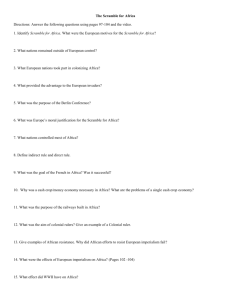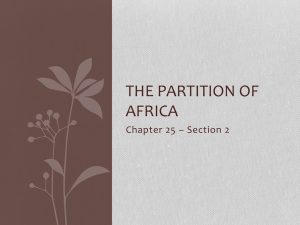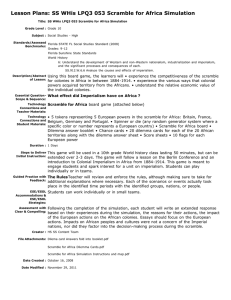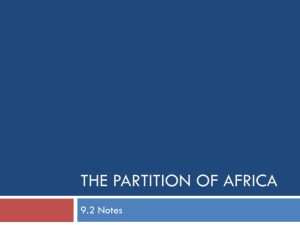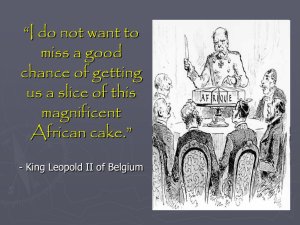The Age of European Imperialism
advertisement
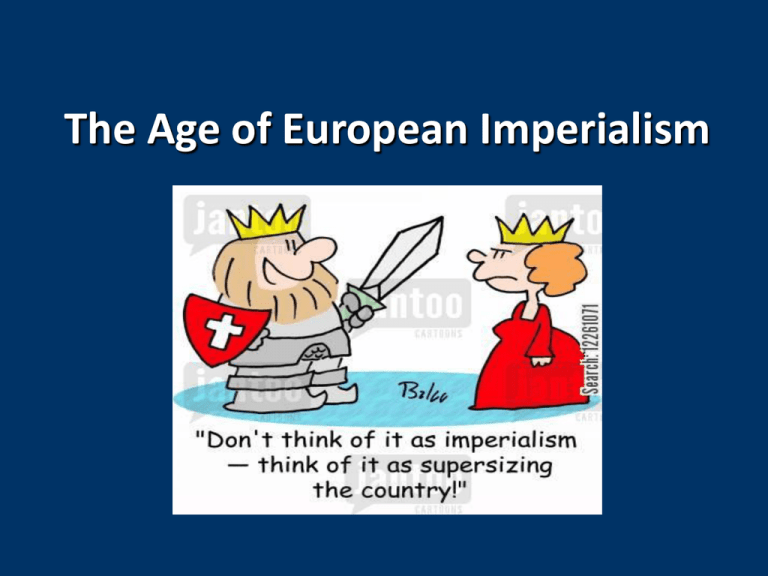
The Age of European Imperialism Definition Imperialism – “the process by which one state, with superior military strength and more advanced technology, imposes its control over the land, resources, and population of a less-developed region.” Simply put, the building of an empire. E.M.P.I.R.E E = Exploration Map new territories Locate native people Identify natural resources M = Militarism Build up defenses Protect global interests E.M.P.I.R.E P = Politics Control another govt. More resources than others I = Ideology Make others like Europeans “White Man’s Burden” E.M.P.I.R.E R = Religion Convert natives to their beliefs The native religion is wrong E = Economics Increase supply and demand Make MONEY Scramble for Africa Scramble for Africa Before the 1800s, European contact was largely limited to the coastal areas. Europeans were largely ignorant of the interior locations within Africa. They were content to let African rulers and merchants represent European interests. Scramble for Africa Slave trading declared to be an illegal practice— 1808, United States and Great Britain. Europe increased their interest in other forms of trade, particularly natural resources. Europeans began to seek a more permanent influence in Africa. Scramble for Africa Growing tensions between Europeans and African governments. South Africa a notable target of imperialism. This area first settled by the Dutch. Scramble for Africa In 1795, the British seized the Dutch occupied CAPE TOWN and local surrounding areas. Discovery of diamonds and gold by the British. Scramble for Africa Boer Wars (1880-1881 and 1899-1902). British fight the Boers (Dutch) to obtain resources. Guerilla resistance from Boers = British respond with crop burning and detention camps. Victory for the British results in an addition of the entire South African region to their empire. Scramble for Africa South Africa was allowed to draft a constitution. Only white men could vote—concession to the Boers. African people had very few rights. System of legal segregation. Apartheid (1948-1994). System comparable to the Jim Crow South in the United States. Scramble for Africa Egypt part of the Ottoman Empire since 1517. Becomes increasingly industrialized over time— modern army, public schools, businesses. 1869 – Suez Canal construction was finished. Connected the Mediterranean and Red Seas. Scramble for Africa Egypt borrowed money to construct the canal. Stock sold to investors to pay off debt—Britain was the biggest. 1882 – Britain controlled the Suez Canal and Egypt. Scramble for Africa Otto von Bismarck – “All this colonial business is a sham, but we need it for elections.” Germany and Britain would become colonial rivals. 1884 – Berlin Conference to settle conflicts. Agreement on rules for colonization Nations must notify each other (Effective Occupation) NO AFRICAN REPRESENTATIVES WERE INVITED Scramble for Africa By 1914, nearly all of Africa was controlled by European powers—Ethiopia and Liberia, exceptions. Impact on Africa included – Europeans placed into positions of power Western culture was spread Traditional African culture was shattered Africans forced to work for the benefit of Europeans Original African boundaries not honored (conflict) British Rule in India Objective: Students will examine the impact of British rule in India and how the cultural practices of the Indian people were disrupted throughout the region. British Rule in India Over the course of the eighteenth century, British influence in India had increased. British East India Company given power to become involved in India’s political and military affairs. Sepoys, Indian soldiers, assigned the role of protecting company interests. British Rule in India 1857 – Sepoy Mutiny Revolt against the British East India Company 1858 – Britain declares India a royal colony and Queen Victoria gains power. British Rule in India British government ruled directly through an official known as a viceroy—governor who ruled as a representative of a monarch. Staff of 3,500 officials were responsible for around 300 million people. This was the largest colonial population in the world. British Rule in India Benefits of British Rule: Order and Stability Efficient Government School Systems Railroads Postal Service Costs of British Rule: Elite Economy Damaged Local Industry Increased Taxes Loss of individual land Food shortage Starvation Indians considered unequal British Rule in India Although Britain had a firm hold on India, many individuals dreamed of independence. Middle class and well-educated citizens would be the first to take action. 1885: Indian National Congress (INC) was formed. Call for greater Indian involvement in government. Wanted to create a path toward independence. British Rule in India Mohandas Gandhi Studied law in London Assisted in South Africa against racial exploitation Nonviolent Resistance East Asia Under Challenge East Asia Under Challenge China was isolated throughout much of its history. As industrialized nations in Europe became more powerful, they were able to push China around. East Asia Under Challenge European trading was limited to a small outlet, known as Canton. The British did not like this arrangement and wanted change. Opium—a highly addictive drug—was a major product the British imported into China. East Asia Under Challenge The Chinese government bans Opium on moral grounds. Once again, the British were not pleased. Result = Opium Wars East Asia Under Challenge Two separate wars, both British victories. China forced to give in to western influences. The island of Hong Kong now British territory. Marked beginning of Western influence in China. East Asia Under Challenge Open Door Policy – proposed by John Hay to ensure equal access to the Chinese market for all nations. Basically, served as picking the pockets of the Chinese. It did calm down the imperialist frenzy. East Asia Under Challenge The Society of Harmonious Fists (AKA: The Boxers) organized a rebellion. Goal was to drive Europe and Japan out of China. Guerilla tactics used to murder Christians. East Asia Under Challenge The rebellion was eventually put down by the major powers—British, French, Germans, Americans, etc. China had to sign the Boxer Protocol. Forced to apologize and take the blame. This included paying back lost money to the other European nations. Rise of Modern Japan Rise of Modern Japan Japan had traditionally avoided foreign influence. They even had restricted their own citizens from traveling abroad. Their long-held isolation prevented them from adopting new techniques over time. Rise of Modern Japan United States was the first foreign power to succeed with Japan. Matthew Perry Arrived by steamship— new to Japan. Rise of Modern Japan Japan slowly opened itself up to foreign influence. Treaties were signed with Europeans, granting access to Japanese markets. Opposition to foreign influence and ultimately act against the shogunate—commonly known as the Meiji Restoration. Rise of Modern Japan Widespread changes to modernize Japan. 1870s – Industrial Revolution. New Emperor = New Laws. Restricted voting rights. Rise of Modern Japan Implementation of a modern military. Private industry, corporations, land ownership all were economic changes. Higher emphasis on the importance of education. All helped bring more power to the Japanese state. Rise of Modern Japan Equal footing with other European powers. Wanted to expand 1895 – War with China to acquire Korea and Taiwan. Rise of Modern Japan 1904 – Russo-Japanese War. Victory for Japan to gain access to Manchuria. Also establishes a sphere of influence for Japan. War solidifies Japan’s place as a new world power.
